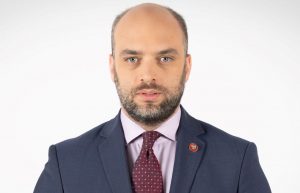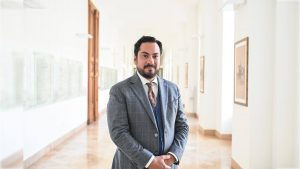He’s a compulsive gadget buyer, but he has an alibi: he’s looking at what changes a new technology can trigger in society. Árpád Rab, a senior researcher at the Information Society Research Institute of the NKE, has monitored changes in digital culture for twenty years.
“Strange-looking people in a small dark room fiddling with strange instruments” – that was how Árpád Rab’s field looked in the early days. What makes his career as a trend researcher special, however, is that he saw the emerging information society as his field of research from the very beginning.
I am indeed playing!
He wrote his doctoral thesis under the supervision of Z. László Karvalics, historian and information society researcher on computer games, under the title “The impact of digital culture on human behaviour through the example of gamification”. Despite this, many people don’t believe that he often really “just” plays on computers. “I’m a teacher, I wear glasses, I wear a jacket; you’d be right to think that I can only do sensible things on a computer. But I do play,” he admits. Beyond games, he also seeks to learn all the ICT, but he’s no longer sitting in a dark room: he loves sports, hiking and drinking beer with his friends. It is true that he buys every new gadget immediately, but there’s always a researcher’s interest in buying gadgets – what will this technology change in society?
Wake up smiling
“I consider myself very lucky to have become a business-oriented researcher and to be able to teach in the meanwhile. I love my lifestyle and I’m grateful for it,” he says, explaining why he gets up every morning with a smile on his face. One minute he’s in a business meeting, the next he teaches university students, and the third he gives educational talks to parents of high school kids – and he loves this buzz. He also appears a lot in the media, which he says is mainly due to the topics he researches, rather than his personal appeal. Árpád Rab was always fascinated by the interaction between man and machines and the direction the world is going as a result. He considers himself lucky to be able to research something that most people are interested in. His work also influences decision-makers – and that is a tremendous responsibility. In many cases, they have helped companies to develop services or products based on their research, worked with their fellow researchers on dozens of government strategies, and he finds it very inspiring to be directly involved in solving actual social or business issues. During his career, he was the project manager of several innovative developments, resulting in new products and technological solutions that have been used by the business ever since. He often advises large companies on strategic development, which involves not only assuming business but also professional responsibility.
Transylvanian roots
Born in Transylvania, Árpád Rab was in primary school when they moved to Hungary in 1990. The family originally spelled Rabb with two b’s, but the Romanian government liked to shorten these noble names, so he became Rab Árpád Szörény in the register. A journalist friend recently wrote an article about those who had been children in Romania in 1989. He also had a conversation with him about it. At the time, several people called him and said, “Árpád, we didn’t know you were from Transylvania; tell us more about the Romanian Revolution. Unfortunately, he does not have any great stories about this period, and it was largely only in retrospect, by reading historical sources, that he understood what happened at that time. His mother’s family still lives in Transylvania; there are many relatives, “they are very nice people, but you have to be careful when drinking with them, because they can hold pálinka very well”. Árpád Rab is proud of his Transylvanian roots. His biologist father taught him Hungarian literature and history in the afternoons. He feels that the reality in Romania, where a teacher taught what was written in the textbook but everyone knew it wasn’t true, prepared him a little for the world of fakenews and post truth (where we believe what we want to believe, regardless of the facts).
The big meeting
He was already in high school in Hungary when a friend showed him his Commodore 64. The computer first entered his life as a gaming platform. He encountered personal computers even more seriously at ELTE. It was very typical at the time that there were only five public computers on the whole campus. In the beginning, nobody was there, and in addition, one could only browse and look at remote libraries, it was not impressive for everyone. However, for Árpád Rab, the Commodore experience of his schooldays came back immediately, that the computer is a great thing. For him, it was already clear that this tool would change everything. In time, he became the machine room manager and administrator.
“What I perceived was that I sat, and while someone was typing in a remote country, I could see what he was writing at home. I felt that this was how we were all going to work from now on,” he says about the moment he became committed to his profession. IT started out as an obsession for four or five people, but then it took off. Apps now provide a very convenient way of life – and we pay for it with our data. The next generation will likely receive the next wow experience from advanced algorithms, namely artificial intelligence.
Trend researcher or futurologist?
According to Árpád Rab, the joy of finding out that something he wrote about before is suddenly on the market is almost addictive. “We start to deal with it now; everyone writes an article about it. And next year another one Four years from now, people will start talking about it, in five years it will be out and the market will pay money for it. Then they’ll look around and find out that someone has been writing about this for five years.” They predicted the emergence of social media, streaming technology (live broadcasts), the success of the sharing economy (such as telecars) or the various devices of smart cities, among others. Because of such predictions, Árpád Rab often wins the title of futurologist from the press. He objects to this only because futurology is a formalised body of knowledge with a well-defined methodology. There is a Future Committee, there is a Prospective Studies Department. Árpád Rab seeks to understand trends and considers culture as a weapon for the survival of mankind. By linking several disciplines to identify the trends that are having a major impact with accuracy, this will lead to an understanding of the present and an outline of what is likely to happen in the next decade.
The Information Society and Trends Research Centre
When he finished his humanities studies in 1999, Árpád Rab found the Information Society and Trends Research Centre (ISRC) on the Internet. He walked in, the head of the institute, Z. László Karvalics, interviewed him and he was employed. Here, all the staff learned quickly, a lot. On the one hand, because Z. Karvalics expected very broad thinking, but also because the BME’s Information Society Research Institute did not receive any funds from the university for basic research, they therefore had to raise it themselves. This quickly pulled young researchers out of the world of navel-gazing, writing for desk-top science. He learned the business approach from Z. Karvalics, namely that you can only research something that creates value that someone is willing to pay for. It was at this institute that they learned to “spin off” knowledge into business. They also utilised their social science knowledge (about the direction the world is going) in market research, business consultancy, innovation development, company trend analysis and social projects.
Now, for example, everybody seems to be interested in the area of e-health. Many people nod their heads in agreement; some even get their heads up and come up with a good idea, a business. It’s an incredible confirmation of a trend when a giant like Apple also comes out with its own device on the market.
Why do you like doing research at the NKE?
He worked at the Institute of Technology at the University of Technology, then at a similar institution at Óbuda University, and currently teaches at Corvinus. “But there, the students are quick to rank the subjects according to their usefulness”. He is happy that even though he teaches his class on Friday nights, even though he says he has a bad memory for faces and never writes a catalogue, people still come to his class.
He was also delighted to accept the invitation from the NKE because of the research opportunity. As a senior researcher, he sees the Information Society Research Institute as a place he always wanted to belong to. To his great delight, he can do his research here in the company of a wide variety of people, with a business mindset from the outset, with support from the university. He believes that the results of the institute will greatly broaden the horizons of the students who attend.
Névjegy
Árpád Rab
Place and date of birth: Gheorgheni, 1977.
Qualifications: Cultural anthropologist, ethnographer, sociologist
Research interests: digital culture, social media, social impact of artificial intelligence, blockchain, personal and organisational information management
Publications: MTMT
Marital status: single
Hobbies: football, diving



